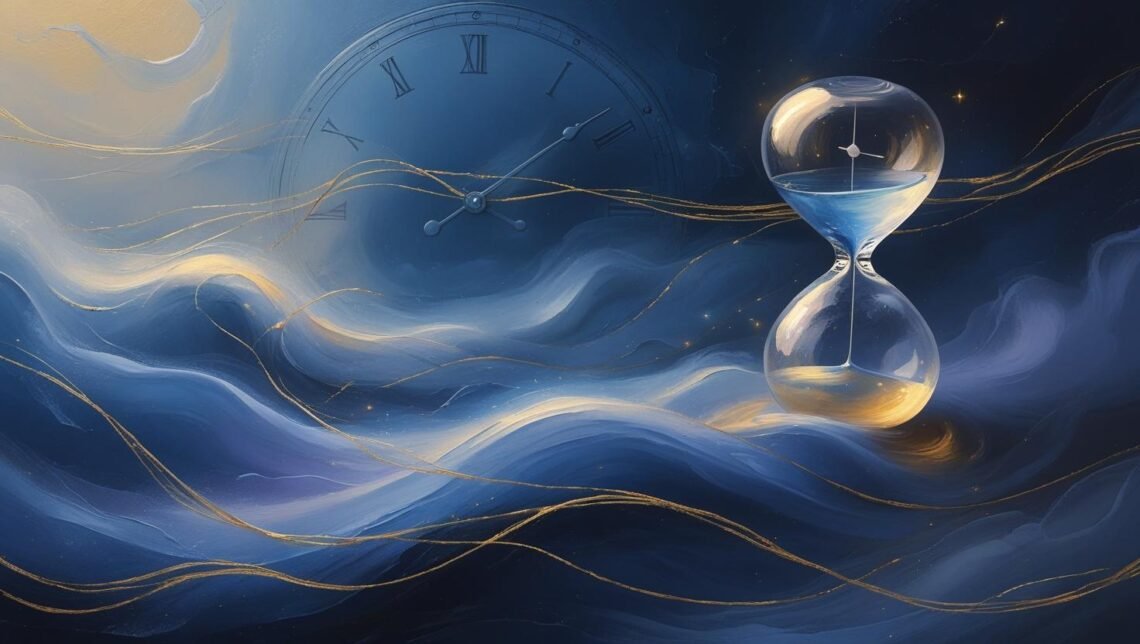It is a strange thing, time. We are born into it like fish into water, hardly noticing its presence until we feel its current tugging at our limbs. As children, it stretches out endlessly before us, a wide plain of summers and birthdays. As we age, it begins to contract. The weeks quicken, the seasons blur, and we find ourselves saying odd things like, “Was that really ten years ago?” as if time were playing some kind of trick.
And perhaps it is. Augustine, in one of his more bewildered moods, once asked, “What then is time? If no one asks me, I know; if I wish to explain it to him who asks, I do not know.” There is comfort, I think, in knowing that even the great minds of history have stood bewildered before the hourglass, watching the sands slip through without quite understanding from whence they come or whither they go.
Some say time is simply the measure of change. Others say it is a dimension, stretched alongside space, a fourth line on the cosmic graph. Still others, those rather severe physicists in their unrumpled coats, insist that time does not really pass at all—that all moments are equally real, and that our sense of time flowing is a trick of consciousness. Past, present, and future are all there, like pages in a book we have not yet read. I confess, I find this notion both exhilarating and faintly distressing, like being told that your memories are just bookmarks.
But for most of us, time is not a theorem or a diagram. It is the aching sense that the morning we loved has already faded into the afternoon, and the afternoon into something altogether less golden. It is birthdays arriving more quickly than we would like, and goodbyes that come too soon. It is the flutter in the chest before a deadline, the pause before an answer, the long hush of grief, and the sudden joy of reunion.
Time lives in the body. It creaks in the knees. It etches itself into the corners of our eyes. It shapes us without asking permission. In a sense, we do not simply pass through time—we are made of it. Our very being is stretched between what has been and what is yet to be, held together by some miraculous thread called the present.
And what a slender thread it is. The present, we are told, is all we ever truly have. Yet it is the one thing we seem least able to grasp. By the time we notice it, it has already passed. It is like trying to catch a soap bubble in your hands—beautiful, brief, and always just beyond.
Still, I suspect the secret lies there, in the shimmering moment. Perhaps we were never meant to conquer time, or even fully understand it. Perhaps we were meant to befriend it. To walk with it like one might walk with an old dog—occasionally impatient, but mostly grateful. To receive its passing not as a loss but as a rhythm, like breathing or waves upon the shore.
Time, after all, is not simply the backdrop against which we live. It is the stage, the script, and the music. It is what allows love to grow, and wounds to heal. It is what makes promises possible and memory sacred. Without it, nothing could unfold. There would be no waiting, no wonder, no becoming.
And so we return to the question: What is time, really?
I do not know, at least not with the kind of knowing that footnotes or lectures can supply. But I suspect it is something more than a ticking clock or a schedule. I suspect it is a mystery wrapped in mercy, the form in which grace arrives to mortal beings like us.
For those of us with ears to hear, perhaps time is whispering something even now: not to hurry, not to hoard, not to despair. But simply to live. To inhabit this hour as if it were enough. Because it is, you know. It always has been.





